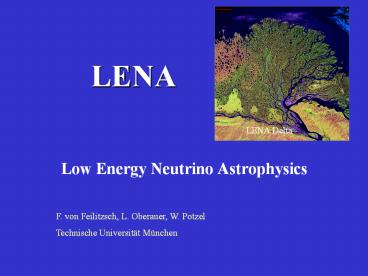LENA - PowerPoint PPT Presentation
Title:
LENA
Description:
Galactic Supernova neutrino detection with Lena. Electron Antineutrino spectroscopy ... Geo - neutrinos and LENA. what is the source of the terrestrial heat flow ? ... – PowerPoint PPT presentation
Number of Views:143
Avg rating:3.0/5.0
Title: LENA
1
LENA
LENA Delta
- Low Energy Neutrino Astrophysics
F. von Feilitzsch, L. Oberauer, W.
Potzel Technische Universität München
2
LENA (Low Energy Neutrino Astrophysics)
Idea A large (30 kt) liquid scintillator
underground detector for
Relic supernovae neutrino detection
Search for Proton Decay
Galactic supernova neutrino detection
Neutrino properties
Terrestrial neutrino detection
Solar Neutrino Spectroscopy
3
Npe 100 / MeV beta 12000 PMs (20 inch)
P - decay event
Scintillator PXE , non hazardous, flashpoint
145 C, density 0.99, ultrapure (as proven in
Borexino design studies)
4
Possible locations for LENA ?
Underground mine 1450 m depth, low
radioactivity, low reactor n-background !
Access via trucks
5
LENA at CUPP
- transport of 30 kt PXE via railway
- loading of detector via pipeline
- no fundamental security problem with PXE !
- no fundamental problem for excavation
- standard technology (PM-encapsulation,
electronics etc.) - LENA is feasible in Pyhäsalmi !
6
Pylos (Nestor Institute) in Greece
7
Galactic Supernova neutrino detection with Lena
Electron Antineutrino spectroscopy
7800
Electron n spectroscopy 65
480
- Neutral current interactions info on all
flavours 4000 and 2200
Event rates for a SN type IIa in the galactic
center (10 kpc)
8
Visible proton recoil spectrum in a liquid
scintillator
all flavors
nm, nt and anti-particles dominate
J. Beacom, astro-ph/0209136
9
Relative size of the different luminosities is
not well known it depends on uncertainties of
the explosion mechanism and the equation of
state of hot neutron star matter
Supernova neutrino luminosity (rough sketch)
T. Janka, MPA
10
SNN-detection and neutrino oscillations with LENA
Modulations in the energy spectrum due to matter
effects in the Earth
Dighe, Keil, Raffelt (2003)
11
SNN-detection and neutrino oscillations
ne
Water Cherenkov
Scintillator good resolution
Modulations in the energy spectrum due to matter
effects in the Earth
Dighe, Keil, Raffelt (2003)
12
Preconditions for observation of those modulations
- SN neutrino spectra ne and nm,t are different
- distance L in Earth large enough
- very good statistics ( 5 kt minimum)
- very good energy resolution (scintillator !)
13
Survival probability
Mixing angle between ne and n2 in Earth matter
Mass difference squared in Earth matter
14
- LENA and relic Supernovae Neutrinos !
- SuperK limit very close to theoretical
expectations - Threshold reduction from 19 MeV (SuperK) to
9 MeV with LENA - Method delayed coincidence of ne p -gt e n
- Low reactor neutrino background !
- Information about star formation in the early
universe
15
Reactor SK
No background for LENA !
Reactor bg LENA !
LENA SNR rate 6 counts/y
SRN
Atmospheric neutrinos
16
Low energy atmospheric neutrinos and LENA
- LENA can measure the low energy part of
atmospheric neutrinos, esp. ne - 30 MeV - 200 MeV ne
- Losc 103 km to 7 x 103 km
- (Dm2 solar neutrinos!)
- ne lt-gt nm atmospheric oscillations, but
based on Dm2solar - observable ?
- ...difficult (low statistics) needs further
investigations
17
Long baseline n - oscillations and LENA ?
- To be investigated
- n spectrum
- e, m - separation potential
- potential in Q13
!
18
Solar Neutrinos and LENA Probes for Density
Profile Fluctuations !
Balantekin, Yuksel TAUP 2003 hep-ph/0303169
7-Be 200 / h LENA
19
- Geo - neutrinos and LENA
- what is the source of the terrestrial heat flow
? - what is the contribution of natural
radioactivity ? - how much of U, Th is in the mantle ?
- (very low bg due to reactors!)
20
- Proton Decay and LENA
- p K n
- This decay mode is favoured in SUSY theories
- The primary decay particle K is invisible in
Water Cherenkov detectors - It and the K-decay particles are visible in
scintillation detectors - Better energy solution further reduces
background
See also R. Swoboda (Taup 03)
21
P -gt K n event structure
T (K) 105 MeV
t (K) 12.8 nsec K -gt m n
(63.5 ) K -gt p p0 (21.2 ) T
(m) 152 MeV T (p) 108 MeV
electromagnetic shower
E 135 MeV m -gt e
n n (t 2.2 ms) p -gt m n (T 4
MeV) m -gt e n n (t 2.2 ms)
22
- 3 - fold coincidence !
- the first 2 events are monoenergetic !
- use time- and position correlation !
- How good can one separate the
- first two events ?
- ....results of a first Monte-Carlo calculation
23
Signal in LENA
m
m
K
K
time (nsec)
P decay into K and n
24
- Background
- Rejection
- monoenergetic K- and m-signal!
- position correlation
- pulse-shape analysis
- (after correction on
- reconstructed position)
25
Sensitivity of LENA ?
- SuperKamiokande has 170 background events in
1489 days (efficiency 33 ) - In LENA, this would scale down to a background of
5 / y and after PSD-analysis this could be
suppressed in LENA to - 0.25 / y ! (efficiency 70 )
- A 30 kt detector ( 1034 protons as target)
would have a sensitivity of t lt a few 1034
years for the K-decay after 10 years measuring
time - The minimal SUSY SU(5) model predicts the K-decay
mode to be dominant with a partial lifetime
varying from 1029y to 1035 y ! - actual best limit from SK t gt 6.7 x 1032 y
(90 cl)
26
- Conclusions
- LENA a new observatory
- complemntary to high energy neutrino
astrophysics - fundamental impact on e.g. geophysics,
astrophysics, neutrino physics, proton decay - feasibiluty studies very promising (Pyhäsalmi)
- costs ca. 100 - 200 M































